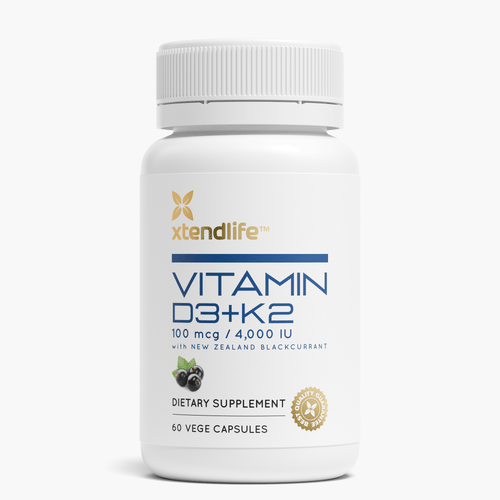Vitamin D is a fat-soluble nutrient your body needs for many different functions. It’s needed for healthy bones because your body can only absorb calcium when vitamin D is present. It also regulates many other cellular functions, and it is particularly crucial for immune health.
Vitamin D has been nicknamed “the sunshine vitamin”. That’s because the bulk of it is obtained through your skin’s exposure to sunlight. Some foods contain low levels of vitamin D – such as oily fish and mushrooms, however, the contribution from dietary sources is low compared to the amount of vitamin D generated by your skin in response to sunlight.
Vitamin D Forms
Vitamin D comes in two forms: vitamin D2 and vitamin D3. Both forms are effectively absorbed into the bloodstream, however, studies show that vitamin D3 is much more effective than vitamin D2 at raising blood levels of calcifediol – the active form of vitamin D. When it comes to choosing a vitamin D supplement, always look for a supplement containing vitamin D3, not vitamin D2.
Immunity and Vitamin D
According to a recent publication, vitamin D deficiency is now more prevalent than ever. In the United States, 61% of the elderly population are vitamin D deficient. This is a major problem, given the important role of vitamin D in immunity.
It has long been known that vitamin D influences your risk of catching common colds and other respiratory infections.
- Those with lower vitamin D levels are more likely to get a common cold,
- Those who take vitamin D supplements are less likely to get a common cold.
- Vitamin D supplementation also reduces the severity and duration of colds.
The latest findings on the role of vitamin D during the pandemic paint a very clear picture. In one recent study, called a meta-analysis, researchers found that data involving nearly 2 million adults showed that vitamin D deficiency clearly increases susceptibility to catching the virus and to developing more severe symptoms.
Another recent study from the pandemic backed up those results. The study showed that people with vitamin D deficiency were 14 times more likely to develop severe or critical illness and their mortality rate was also significantly higher (25.6% compared with 2.3% among those with sufficient levels of vitamin D).
Get Sufficient Vitamin D
To protect yourself from severe outcomes, you should aim to get sufficient vitamin D. The most obvious source of vitamin D is from sunshine, but the amount of exposure needed depends on where you live (distance from the equator), the season, and your skin tone. For many people, getting enough sun is simply not practical either due to the season or spending a lot of time indoors.
To ensure you are getting sufficient intake levels, consider a Vitamin D supplement to fulfill any gaps in your dietary needs.
How Much Vitamin D Do I Really Need?
Wouldn’t it be great if there were a simple answer? Unfortunately, there isn’t. The amount of vitamin D you need depends on your age, ethnicity, sun exposure, the season and the latitude where you reside, besides, smoking, and long-term sunscreen usage could also be the reasons for not getting enough vitamin D.
The National Institutes of Health in the US recommends 400 international units (IU or 10 micrograms) of vitamin D for children up to 12 months, 600 IU for people aged 1 to 70 years, and 800 IU (or 20 micrograms) per day for people over the age of 70 years. However, many experts believe this recommendation is too low.
You can measure your vitamin D status through a simple blood test. Depending on who you ask, blood levels between 20ng/ml and 30ng/ml are considered sufficient.
Studies in postmenopausal women with low vitamin D levels found that ingesting 800 – 2,000 IU vitamin D raised blood levels to the lower end of “sufficient”. However, higher doses were needed to reach the higher end of “sufficient”. People who are overweight or obese may also need higher amounts of vitamin D to achieve sufficient blood levels.
If a blood test doesn’t appeal, all things considered, a daily vitamin D intake of 800 – 4,000 IU (or 25 – 100 micrograms) should be enough for most people.
According to the National Institutes of Health, the safe upper limit of vitamin D intake is 4,000 IU (or 100 micrograms). However, research conducted in a hospital over seven years showed that long-term supplementation with vitamin D3 in doses ranging from 5,000 to 50,000 IU/day appears to be safe. In a separate study, individuals who took doses of vitamin D3 over several years with doses of 10,000 – 60,000 reported no safety concerns or side effects.
Studies in which people take high doses of vitamin D3 (over 10,000 IU) are usually done in the context of wanting a treatment for an autoimmune disorder, such as psoriasis or rheumatoid arthritis. In fact, at high doses, vitamin D3 inhibits the immune system, hence dampening down the body’s autoimmune response.
If you’re considering a daily dose of vitamin D above 4,000 IU (or 100 micrograms), we recommend you check with your health professional first.
Should I Take a Vitamin D Supplement?
If your lifestyle or the seasons mean you are struggling to get outside each day, vitamin D supplements to help boost your immunity could be a great option.
Our newly released Vitamin D3+K2 is carefully formulated with high strength of vitamin D3 and K2, plus unique New Zealand blackcurrant antioxidants to support your immune system.
With the synergistic effect of vitamin D3 and K2, it also helps with calcium absorption and deposits into the teeth and bones.
Support Your Immune System and Bone Strength
A high strength of carefully selected vitamin D3 and K2, plus unique New Zealand blackcurrants antioxidants.
Shop now


 Supplements
Supplements Bundles
Bundles

















